

Vizier. Not to be confused with visor.
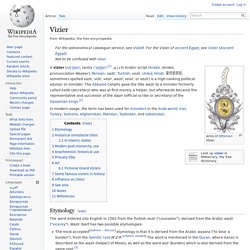
A vizier (/vɪˈzɪər/, rarely /ˈvɪzjər/;[1] وزير in Arabic script (Arabic (Arabic pronunciation Wazeer), Persian: vazīr, Turkish: vezir, Urdu); Hindi: वज़ीर; sometimes spelled vazir, vizir, vasir, wazir, vesir, or vezir) is a high-ranking political advisor or minister. The Abbasid Caliphs gave the title wazir to a minister formerly called katib (secretary) who was at first merely a helper, but afterwards became the representative and successor of the dapir (official scribe or secretary) of the Sassanian kings.[2] Etymology[edit] The word entered into English in 1562 from the Turkish vezir ("counselor"), derived from the Arabic wazir ("viceroy"). Wazir itself has two possible etymologies: The most accepted[dubious ] etymology is that it is derived from the Arabic wazara ("to bear a burden"), from the Semitic root W-Z-R. Historical ministerial titles[edit] In Islamic states[edit] Modern post-monarchy use[edit] House of Saud. The House of Saud (Arabic: آل سعود Āl Saʻūd) is the ruling royal family of Saudi Arabia.

The family has thousands of members. Raymond A. Spruance. Raymond Ames Spruance (July 3, 1886 – December 13, 1969) was a United States Navy admiral in World War II.
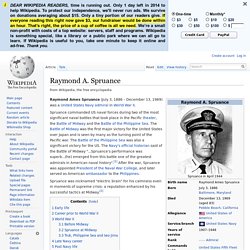
Spruance was nicknamed "electric brain" for his calmness even in moments of supreme crisis: a reputation enhanced by his successful tactics at Midway.[2] Early life[edit] Spruance was born in Baltimore, Maryland to Alexander and Annie Spruance. He was raised in Indianapolis, Indiana.[3] Spruance attended Indianapolis public schools and graduated from Shortridge High School. From there, he went on to graduate from the U.S. Career prior to World War II[edit] Spruance ran a quiet bridge, without chit-chat; he demanded that orders be given concisely and clearly. Q.E.D. Etymology and early use[edit] The phrase quod erat demonstrandum is a translation into Latin from the Greek ὅπερ ἔδει δεῖξαι (hoper edei deixai; abbreviated as ΟΕΔ).
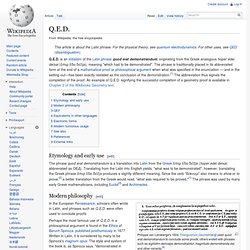
Translating from the Latin into English yields, "what was to be demonstrated"; however, translating the Greek phrase ὅπερ ἔδει δεῖξαι produces a slightly different meaning. Since the verb "δείκνυμι" also means to show or to prove,[2] a better translation from the Greek would read, "what was required to be proved.
"[1] The phrase was used by many early Greek mathematicians, including Euclid[3] and Archimedes. Modern philosophy[edit] Philippe van Lansberge's 1604 Triangulorum Geometriæ used quod erat demonstrandum to conclude some proofs; others ended with phrases such as sigillatim deinceps demonstrabitur, magnitudo demonstranda est, and other variants.[4] In the European Renaissance, scholars often wrote in Latin, and phrases such as Q.E.D. were often used to conclude proofs. Hirohito. Hirohito (裕仁?)
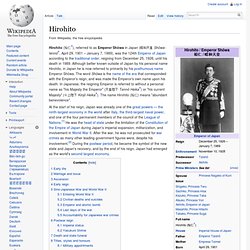
, referred to as Emperor Shōwa in Japan (昭和天皇, Shōwa-tennō? , April 29, 1901 – January 7, 1989), was the 124th Emperor of Japan according to the traditional order, reigning from December 25, 1926, until his death in 1989. Although better known outside of Japan by his personal name Hirohito, in Japan he is now referred to primarily by his posthumous name Emperor Shōwa. The word Shōwa is the name of the era that corresponded with the Emperor's reign, and was made the Emperor's own name upon his death. Emperor Taishō. Akihito. Akihito (明仁?
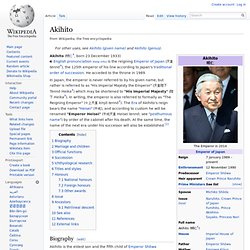
, born 23 December 1933) English pronunciation is the reigning Emperor of Japan (天皇, tennō?) , the 125th emperor of his line according to Japan's traditional order of succession. He acceded to the throne in 1989. Emperor Meiji. Emperor Meiji (明治天皇, Meiji-tennō?
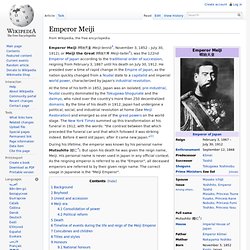
, November 3, 1852 – July 30, 1912), or Meiji the Great (明治大帝, Meiji-taitei?) , was the 122nd Emperor of Japan according to the traditional order of succession, reigning from February 3, 1867 until his death on July 30, 1912. He presided over a time of rapid change in the Empire of Japan, as the nation quickly changed from a feudal state to a capitalist and imperial world power, characterized by Japan's industrial revolution. Ankh. Ankh It represents the concept of eternal life, which is the general meaning of the symbol.
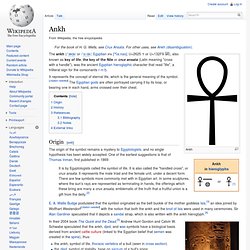
[citation needed] The Egyptian gods are often portrayed carrying it by its loop, or bearing one in each hand, arms crossed over their chest. Origin[edit] The origin of the symbol remains a mystery to Egyptologists, and no single hypothesis has been widely accepted. Dances with Wolves (1990) Franklin D. Roosevelt. Franklin Delano Roosevelt (/ˈroʊzəvəlt/ ROH-zə-vəlt, his own pronunciation,[1] or /ˈroʊzəvɛlt/ ROH-zə-velt) (January 30, 1882 – April 12, 1945), commonly known by his initials FDR, was an American lawyer and statesman who served as the 32nd President of the United States.
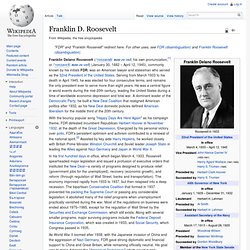
Serving from March 1933 to his death in April 1945, he was elected for four consecutive terms, and remains the only president ever to serve more than eight years. He was a central figure in world events during the mid-20th century, leading the United States during a time of worldwide economic depression and total war. A dominant leader of the Democratic Party, he built a New Deal Coalition that realigned American politics after 1932, as his New Deal domestic policies defined American liberalism for the middle third of the 20th century.
Eleanor Roosevelt. Anna Eleanor Roosevelt (/ˈɛlɨnɔr ˈroʊzəvɛlt/; October 11, 1884 – November 7, 1962) was an American politician.
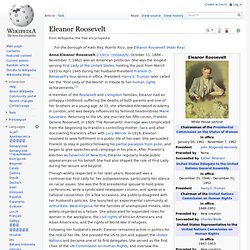
She was the longest-serving First Lady of the United States, holding the post from March 1933 to April 1945 during her husband President Franklin D. Roosevelt's four terms in office. President Harry S. Truman later called her the "First Lady of the World" in tribute to her human rights achievements.[1] A member of the Roosevelt and Livingston families, Eleanor had an unhappy childhood, suffering the deaths of both parents and one of her brothers at a young age.
Though widely respected in her later years, Roosevelt was a controversial First Lady for her outspokenness, particularly her stance on racial issues.